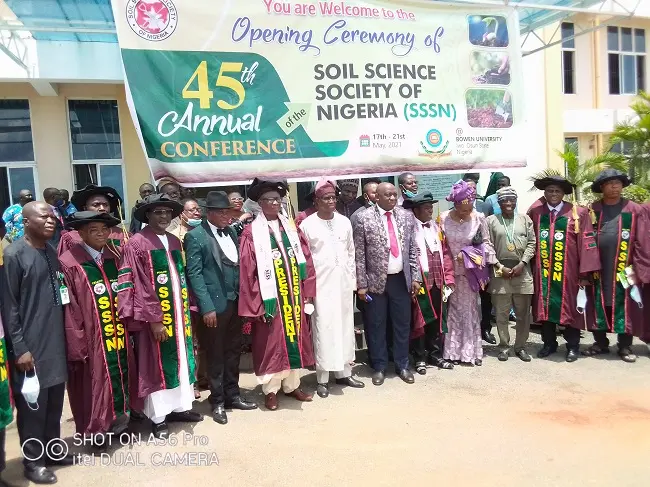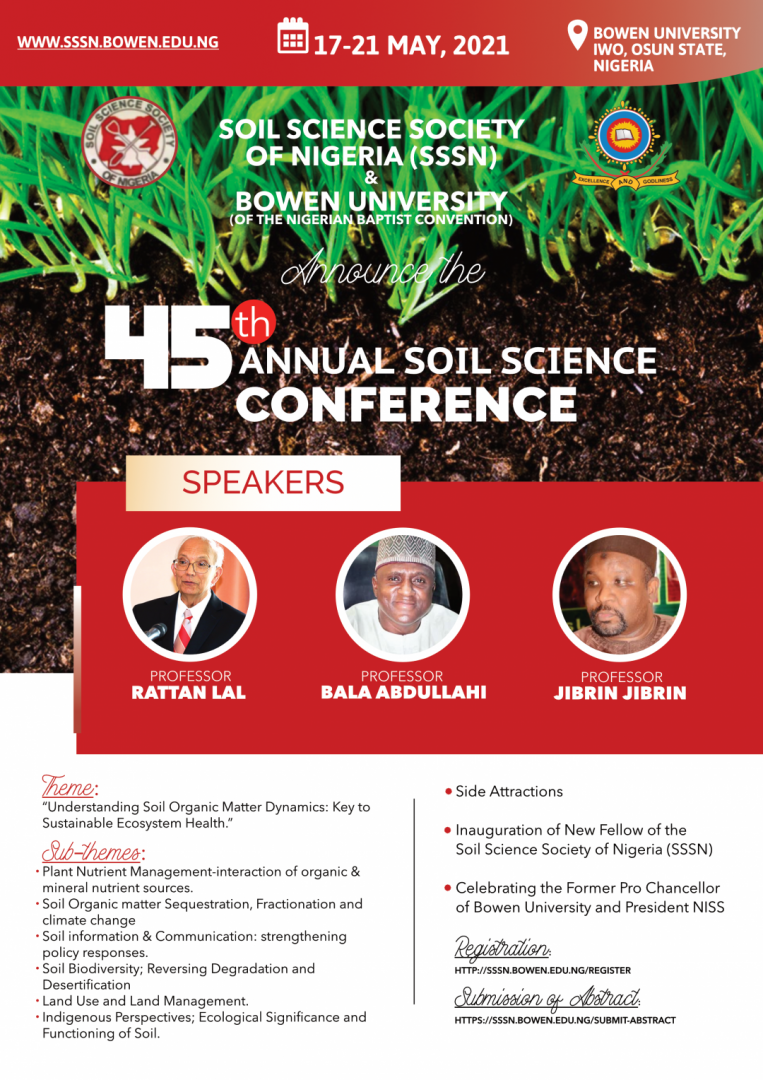
Nigerian soil scientists have stressed the need for land users in Nigeria to avoid all forms of destructive use of soil for farming processes.
Speaking at the 45th Annual Conference of the Soil Science Society of Nigeria ( SSSN), held at Bowen University, Iwo, recently, the society reiterated with emphasis, that quality and sufficient food production in Nigeria is depended on how much we can preserve the soil nutrients that support commercial food production for the nation.
Drawn their discussion from the theme of this year’s conference; Understanding Soil organic matter dynamics: key to sustainable Ecosystem health and food security, the conference, opined that preservation of carbon in the soil is key to keep the soil alive in order to perform its functions efficiently well to human survival.
Addressing the participants at the opening ceremony held on Tuesday, the President of the society, Professor Bashiru Raji asserted that Soil management to ensure sustainable ecosystem health and food security is essential in the food shortage situation control in the country.
According to him, the carbon in the soil is an indicator for food security against climate change, adding that the knowledge about how soil could be managed to address the challenges of ensuring food security should be shared among the land users in the country.
While he enjoined the Nigerian government to find a lasting solution to all the forms of insurgents pervading the country, which are very inimical to agribusiness, he said the government should strive to take stock of its achieved progress in land restoration and collaborate with soil scientists in its bid to manage the soil for its sustainability as natural resources.
Society condemned in its totality, the excessive use of inorganic materials on soil with an intent to boost its yields. According to Dr Obianuju Orji from Rivers State University, Port Harcourt, Soil can be made alive and can as well be killed depending on the ways it is being handled. She warned that soil nutrients are not easily replaceable when it loses its natural resource.
She said: ” With the current climate change in the ecosystem the deplete of carbon matter and sequestration, the more the carbon we can tie up in the soil, the less we have as greenhouse gases that affect climate change for food security. Most of the plants’ available nutrients are in organic form. A lot of our soil is depleted, as we continue to cultivate the soil, the plants take away the nutrient from the soil, and if it is not replenished it depleted. Before now, farmers used inorganic materials that are not healthy for the environment and soil’s life. But the trend now is using the organic materials as sources of nutrient to maintain a healthy soil structure.”
Speaking in the same vein at the occasion, the Vice President, Administration, Nigerian Baptist Convention, Deacon Musa, Ubandoma, who represented the President of the Convention, Rev Dr Supo Ayokunle, at the occasion, commended the organizers for the theme of the conference, describing it as apt.
He then appealed to the Nigerian government at all levels to increase the budget allocation for the Agriculture sector. According to him, the development would go a long way to address food shortages in the country. having controlled the courses of insecurity in the nation.
The vice Chancellor, Bowen University Professor Joshua Ogunwole, an erudite soil scientist, in his welcome address as the chief host of the conference, stated that soil is critical to agriculture and that it should not be held with levity. He added that organic matter is very important for sustainable soil health.
“The society would ever be ready to make its impact felt in the sustainable ecosystem health and food security process in Nigeria.”
In spite of the huge investment in the water sector by the government and international organisations, water scarcity has grown to become a perennial nightmare for residents of Abeokuta, the Ogun State capital. SSSN makes case for soil conservation for food security assurance ; SSSN makes case for soil conservation for food security assurance ; SSSN makes case for soil conservation for food security assurance ; SSSN makes case for soil conservation for food security assurance.

